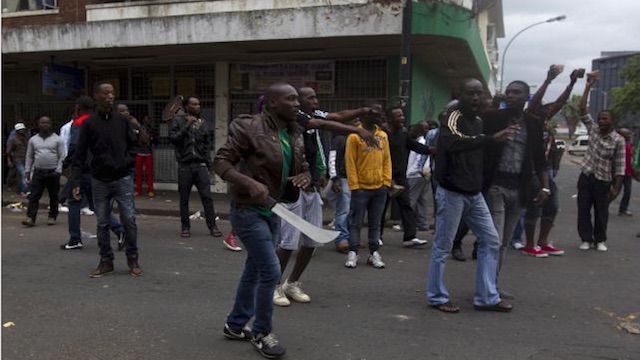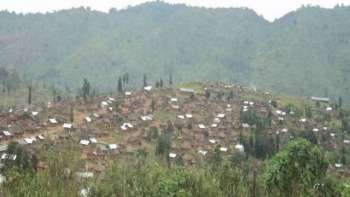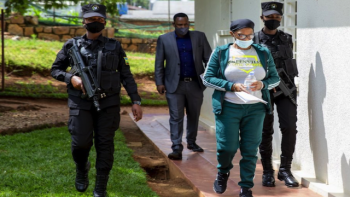Zulu King Goodwill Zwelithini, addressing a recent gathering of his subjects, said, according to the media, that "foreigners should pack their bags and go" because they are taking jobs from South African citizens. Immediately, mobs of unemployed South Africans, mostly young men, took to the streets and started attacking African migrants in the port city of Durban.
Soon after, the unrests spread across the country and targeted foreigners, mostly Africans and those pereceived as such. Gangs of young men, armed with clubs and stones rampaged cities, looting and setting shops ablaze.
Machete-wielding mobs and gang attackers started hacking African immigrants to death across most major cities in South Africa. Those who could
not hide in their homes, fled to police stations and other guarded places, such as public buildings, stadiums, hospitals, and churches.
In some instances, several african foreigners were dragged from their homes, put in rubber tires, and set ablaze alive.
"It was a scene from the most horrible human tragedy, " witnesses in South Africa told AfroAmerica Network.
The attacks are surprising from a country not long ago under the yoke of apartheid and now trying to portray itself as a diverse nation. The killings of African immigrants from neigbouring countries, such as Mozambique, Zambia, and Zimbabwe, are even more shocking and beyond comprehension, given that these countries bore the blunt of South Africa Apartheid government and its allies, for welcoming South African black leaders and refugees, and funding the Africa National Congress (ANC) freedom fighters. As the South African Ambassador to the Democratic Republic of the Congo (DRC), N’tsiki Mashimbye, put it, while apologing for the killings on the behalf of his government:
"We [South Africans] are, because you are. We will never forget where we come from. If we are where we are today, it is because of the many sacrifices by other Africans." Whether those behind the machete - wielding mobs share similar views remain to be seen.
the Zulu King has dienied that he encouraged the mob to attack African migrants. However, the United Nations said the attacks started in March following a labor dispute between South Africans and foreign workers. With the unemployment in South Africa reaching 25%, jobs have become scarce and African migrants have managed to get a sizeable share of the unskilled jobs, previsouly not wanted by South Africans. Hence, with economic crisis worsening, South Africans started accusing African immigrants of taking their jobs, undermining businesses owned by locals, and fueling the already high crime rate.
South Africans have, in their short history as a democratic country, reverted to Xenophobia, when faced with economical or social challenges.
In 2006, violence against African immigrants took several months to quiet down in the city of Cape Town
in 2008, Johannesburg became the epicenter of xenophobic acts, that left dozens dead. Violence quickly spread to Cape Town and tens of Zimbabweans were killed.
In January, looters burned businesses owned by foreigners in another wave of xenophobic attacks. In addition, there were other incidents of violence last year, Human Rights Watch said.
The victims of xenophobic attacks come from several African nations, including Kenya, Malawi, Zimbabwe, Democratic Republic of the Congo, Nigeria, Rwanda, Somali, and Ethiopia.
Several countries have started evacuating their citizens and some have already started retaliating against South Africans or South African interests.
"I would want now to express our sense of shock, disgust as we abhor the incidences which happened in Durban," said Zimbabwean President Robert Mugabe, who is also teh chair of Southern African Development Community (SADC) and African Union, before adding: "the act of treating other Africans in that horrible way can never be condoned by anyone." .
An estimated one million Zimbabweans live in South Africa. According to Zimbabwean media, Zimbabwe plans to repatriate 1,000 of its citizens and was setting up a receiving center at Beitbridge, the biggest border post with South Africa.
The Malawian government also said, through Information Minister Kondwani Nankhumwa, that it has hired buses to repatriate 500 of its nationals, said on Friday.
China and the African Union have condemned the xonophobic attacks.
Fears of more attacks and killings has pushed several South Africans to condemn Xenophia through social media and streets potests.


















